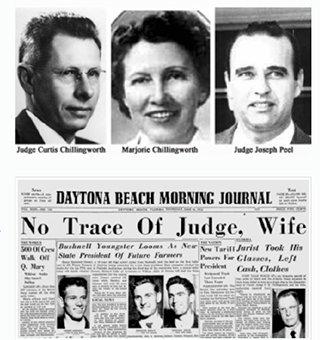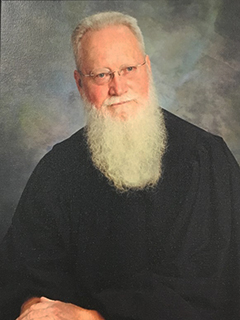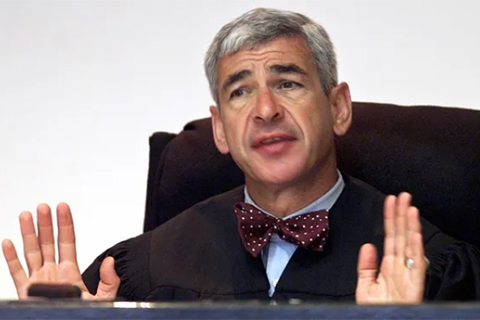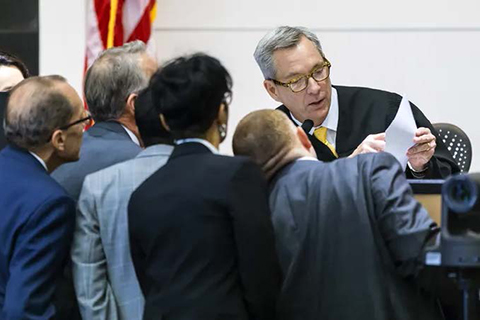Holland v. Board of Public Instruction

Murder Trials of Judge and Mrs. Chillingworth
On June 16, 1955, Judge C.E. Chillingworth and his wife Marjorie went missing. After a search of their home and the adjacent beach area, foul play was suspected.
Five years after the judge and his wife's presumptive murders, Floyd Holzapfel, a West Palm Beach garage attendant, confessed to his role. He and a pool room operator named Bobby Lincoln murdered the couple in a plan masterminded by Municipal Judge Joseph A. Peel. Judge Peel had been taking payoffs and selling protection to local moonshiners and numbers runners. When police brought search warrants for his signature, Peel tipped off the suspects. Chillingworth discovered the corruption and vowed to have Peel disbarred.
Holzapfel was sentenced to life in prison, while Lincoln was given immunity in exchange for his testimony. Peel served 21 years in federal prison before he was released on parole. He died in Jacksonville in 1982.

Spencer v. State of Florida

In 1989, attorney Nelson Bailey, who would later become a County Court judge in the 15th Circuit, successfully challenged the jury selection process on the basis that the jury districts (Belle Glade and West Palm Beach) distorted the population mix, resulting in the inability to draw prospective jurors from a fair representative cross-section of the county.
The outcome of this case changed the jury selection process, which now takes place only at the Main Courthouse located in West Palm Beach and pulls potential jurors from the entire county.
FL v. William Kennedy Smith
In 1991, Judge Mary E. Lupo presided over the rape trial of William Kennedy Smith. The trial was the first notable high profile case, with multiple national news publications and outlets present in and outside of the Palm Beach County Courthouse.
Smith was acquitted on the charge.

FL v. American Tobacco Co.

In 1997, Attorney Robert Montgomery served as the state of Florida's lead counsel in a case that forced the tobacco industry to agree to pay $11.3 billion to recover Medicaid expenses for smoking-related diseases.
Florida was the second state to reach a settlement with tobacco companies over health care costs.
2000 Presidential Election

Bush immediately filed an emergency application in the U.S. Supreme Court asking it to pause the state Supreme Court's order. The U.S. Supreme Court granted his request and also agreed to review the merits of the case. After holding oral arguments on Dec. 11, 2000, the Court issued an unsigned opinion reversing the Florida Supreme Court's order. In a 7-2 ruling, a majority of the Court held that the recount process ordered by the state Supreme Court violated the U.S. Constitution's 14th Amendment because counting standards were not consistent across counties.
In a narrower 5-4 ruling, a majority of the Court held that no further recount could be conducted due to time constraints. After this decision, Florida's recounts were stopped and its electoral votes went to Bush, handing him the presidency.
State v. Nathaniel Brazill

In 2001, Judge Richard Wennet presided over the murder trial of then 13-year old Nathaniel Brazill. Brazill was convicted of second-degree murder after shooting and killing a teacher, Barry Grunow at his middle school. Brazill was sentenced to 28 years in prison.
The case sparked interest from national media as Grunow's death was a prominent case of school violence, occurring just a year after the Columbine massacre. The death of Grunow was the first of its kind in Palm Beach County.
State v. Nouman Raja

